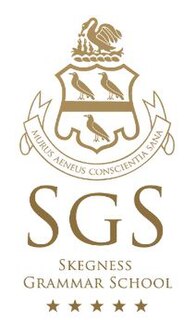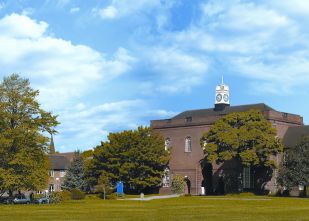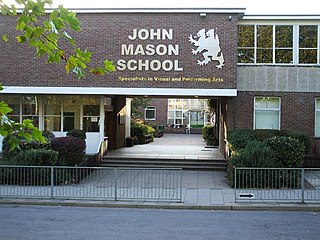Related Research Articles
A grammar school is one of several different types of school in the history of education in the United Kingdom and other English-speaking countries, originally a school teaching Latin, but more recently an academically oriented secondary school, differentiated in recent years from less academic secondary modern schools. The main difference is that a grammar school may select pupils based on academic achievement whereas a secondary modern may not.
Education in England is overseen by the United Kingdom's Department for Education. Local government authorities are responsible for implementing policy for public education and state-funded schools at a local level.
Education in Scotland is overseen by the Scottish Government and its executive agency Education Scotland. Education in Scotland has a history of universal provision of public education, and the Scottish education system is distinctly different from those in the other countries of the United Kingdom. The Scotland Act 1998 gives the Scottish Parliament legislative control over all education matters, and the Education (Scotland) Act 1980 is the principal legislation governing education in Scotland. Traditionally, the Scottish system at secondary school level has emphasised breadth across a range of subjects, while the English, Welsh and Northern Irish systems have emphasised greater depth of education over a smaller range of subjects.
Education in Northern Ireland differs from education systems elsewhere in the United Kingdom, but is similar to the Republic of Ireland in sharing in the development of the national school system and serving a similar society with a relatively rural population. A child's age on 1 July determines the point of entry into the relevant stage of education in the region, compared to 1 September in England and Wales. Northern Ireland's results at GCSE and A-Level are consistently higher than those in England and Wales; Scotland uses a different examination system.
State schools or public schools are generally primary or secondary schools that educate all students without charge. They are funded in whole or in part by taxation. State funded schools exist in virtually every country of the world, though there are significant variations in their structure and educational programmes. State education generally encompasses primary and secondary education.

A comprehensive school typically describes a secondary school for pupils aged approximately 11–18, that does not select its intake on the basis of academic achievement or aptitude, in contrast to a selective school system where admission is restricted on the basis of selection criteria, usually academic performance. The term is commonly used in relation to England and Wales, where comprehensive schools were introduced as state schools on an experimental basis in the 1940s and became more widespread from 1965. They may be part of a local education authority or be a self governing academy or part of a multi-academy trust.

Skegness Grammar School is a coeducational grammar school and sixth form with academy status, located in Skegness, Lincolnshire, England.

The specialist schools programme (SSP), first launched as the Technology Colleges programme and also known as the specialist schools initiative, specialist schools policy and specialist schools scheme, was a government programme in the United Kingdom which encouraged state schools in England and Northern Ireland to raise private sponsorship in order to become specialist schools – schools that specialise in certain areas of the curriculum – to boost achievement, cooperation and diversity in the school system. First introduced in 1993 to England as a policy of John Major's Conservative government, it was relaunched in 1997 as a flagship policy of the New Labour governments, expanding significantly under Prime Minister Tony Blair and his successor Gordon Brown. The programme was introduced to Northern Ireland in 2006, lasting until April 2011 in England and August 2011 in Northern Ireland. By this time, it had established a near-universal specialist system of secondary education in England, with almost every state-funded secondary school in England having specialised. This system replaced the comprehensive system which had been in place since the 1970s.
In England and Wales, a foundation school is a state-funded school in which the governing body has greater freedom in the running of the school than in community schools. Foundation schools were set up under the School Standards and Framework Act 1998 to replace grant-maintained schools, which were funded directly by central government. Grant-maintained schools that had previously been voluntary controlled or county schools usually became foundation schools.
A voluntary controlled school is a state-funded school in England and Wales in which a foundation or trust has some formal influence in the running of the school. Such schools have less autonomy than voluntary aided schools, in which the foundation pays part of any building costs.

In the United Kingdom, a Technology College is a specialist school that specialises in design and technology, mathematics and science. Beginning in 1994, they were the first specialist schools that were not CTC colleges. In 2008, there were 598 Technology Colleges in England, of which 12 also specialised in another subject.
In England, a partially selective school is one of a few dozen state-funded secondary schools that select a proportion of their intake by ability or aptitude, permitted as a continuation of arrangements that existed prior to 1997. Though treated together by current legislation, they are of two types: bilateral schools in remnants of the Tripartite System, and former grant-maintained schools that introduced partial selection in the 1990s. While technically classified as comprehensive schools, they occupy a middle ground between grammar schools and true comprehensives, and many of the arguments for and against grammar schools also apply to these schools. Although there are relatively few schools of this type, several of them score very highly in national performance tables, and are among the most over-subscribed schools in the country.
The history of education in England is documented from Saxon settlement of England, and the setting up of the first cathedral schools in 597 and 604.

A direct grant grammar school was a type of selective secondary school in the United Kingdom that existed between 1945 and 1976. One quarter of the places in these schools were directly funded by central government, while the remainder attracted fees, some paid by a Local Education Authority and some by the pupils' parents or guardians. On average, the schools received just over half of their income from the state.

The School Standards and Framework Act 1998 was the major education legislation passed by the incoming Labour government led by Tony Blair. This Act:
A voluntary aided school is a state-funded school in England and Wales in which a foundation or trust, contributes to building costs and has a substantial influence in the running of the school. In most cases the foundation or trust owns the buildings.
A community school in England and Wales is a type of state-funded school in which the local education authority employs the school's staff, is responsible for the school's admissions and owns the school's estate. The formal use of this name to describe a school derives from the School Standards and Framework Act 1998.

The Howard School is a boys' secondary school in Rainham, Kent, England, with approximately 1,500 pupils. It offers a partially selective system and is one of only five bi-lateral schools in the United Kingdom. The partially selective system permits admission to the grammar school section by the 11-Plus selection, however a passing mark is not required if the pupil is seen to have the ability to work in the 'grammar stream', and non-selective admission to the high school. The school is a Sports College.

English state-funded schools, commonly known as state schools, provide education to pupils between the ages of 3 and 18 without charge. Approximately 93% of English schoolchildren attend 20,000 or so such schools. Since 2008 about 75% have attained "academy status", which essentially gives them a higher budget per pupil from the Department for Education.

A comprehensive school typically describes a secondary school for pupils aged approximately 11–18, that does not select its intake on the basis of academic achievement or aptitude, in contrast to a selective school system where admission is restricted on the basis of selection criteria, usually academic performance. In England and Wales comprehensive schools were introduced as state schools on an experimental basis in the 1940s and became more widespread from 1965. They may be part of a local education authority or be a self governing academy or part of a multi-academy trust.
References
- 1 2 3 4 Levinson, David; Cookson, Peter W.; Sadovnik, Alan R. (2002). Education and Sociology. Taylor & Francis. pp. 215–218. ISBN 0-8153-1615-1.
- 1 2 3 4 "Grant Maintained Schools Database: Dataset Documentation". The National Digital Archive of Datasets. The National Archives. 1999. Retrieved 16 April 2015.
- ↑ Wintour, Patrick (5 December 1995). "Attack on 'incomprehensible' policy incenses Blunkett". The Guardian . Retrieved 1 February 2009.
- 1 2 School Standards and Framework Act 1998, Her Majesty's Stationery Office.
- ↑ "The Composition of Schools in England" (PDF). Department for Children, Schools and Families. June 2008. Archived from the original (PDF) on 24 February 2009.
- ↑ Clare, John (26 October 2005). "Funding for schools to be 'fair and equal'". The Daily Telegraph . Archived from the original on 5 May 2013. Retrieved 1 February 2009.
- ↑ Baker, Mike (31 July 2010). "Gove's academies: 1980s idea rebranded?". BBC News Online .